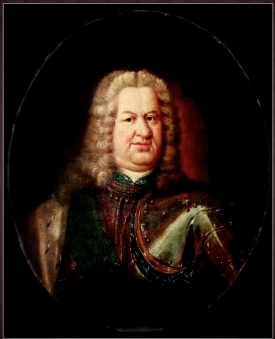
In the spring of 1733, it seemed certain that Stanisław Leszczyński would be elected to the throne. His supporters were in a strongly dominant position. The largest fractions that used to fiercely combat each other now opted for Stanisław Leszczyński: "Familia" with the Mazowsze Voivode and Crown Regiment Commander, Stanisław Poniatowski in the lead and the Potocki, led by Primate Teodor. Leszczyński's opponents, who were in minority and subject to intimidation, were unable, especially in the first phase of interregnum, to undertake any major actions. However, if Louis XV's father-in-law were elected as the king, France would gain significant impact on Poland, which its neighbours (especially Austria and Russia) could not accept. The only realistic alternative was the candidature of Frederick August II, Elector of Saxony, whom they previously tried to prevent by promoting the Portuguese Infant don Emanuel.
The pre-election Sejm in May decided to exclude foreign nationals from among the candidates to the throne, which was a huge success of the group of Stanisław's supporters. However, frictions soon started within the group. When it became evident that the neighbouring countries would never accept a candidate supported by France and when rumours of the concentration of Moscow troops at the Lithuanian border proved to be true, many understood that electing Stanisław Leszczyński would mean a war. After the Moscow army entered the territory of the Commonwealth on 11 August, the candidature started to be disapproved by Lithuanian magnates (the Wiśniowiecki, the Sapieha, the Radziwiłł and Paweł Sanguszko, the Royal Marshal of Lithuania), who worried about their huge properties exposed to the revenge of Moscow supporting the Elector of Saxony.
Such was the atmosphere of the Election Sejm that began on 25 August 1733. Two days later, the Lithuanian Regiment Commander, Michał Wiśniowiecki, under the pretext of his dispute with the Cavalry Master of Łęczyce voivodship, Stanisław Śleszyński left the election field and left to Praga (supposedly, out of fear for his life). Over the next few days, all the other opponents of Stanisław Leszczński hurried to Praga. The attempts to bring them back to the election field undertaken in the first days of September were unsuccessful. The election ended on 12 September with Stanisław Leszczyński elected the king of the Commonwealth. The elected king was nominated by the Primate and his election was announced by the Royal Grand Marshal. Before the collecting of votes was completed, a special legation was sent to Praga in order to convince the senators and noblemen there to return to the election field. However, when the mission was about to end, a roar of gunshots and cheering reached Praga, announcing that the Primate had already finished nominating Stanisław Leszczyński. This outraged the "Praga people," who officially protested against the election.
Over the next few days, the main goal of Stanisław's supporters was to prevent re-election. Fearing a similar situation like in 1697, when re-nomination was effected in trenches, they had the shed burnt down. The most urgent challenge for the army left in Warsaw under the commandment of the Royal Regiment Commander and Kiev Voivode, Józef Potocki was to prevent the return of voters from Praga and re-election before the end of the six-week duration of the Election Sejm. On the other hand, the "Praga people" tried very hard to maintain the formal requirements concerning the time and space of royal election. It was them who insisted on the commander of the Moscow army to attack Warsaw and "open our way to the election field." They also sent a legation to Stanisław's supporters asking their permission to cross the River Vistula or otherwise they would organise royal election in Praga.
Resistance of the royal army indeed forced them to improvise an election field near the village of Kamień. The selection of this particular location, where Henry of Valois had been elected, was an attempt to justify at least partially the fact that the election was effected outside the legal election field.
On 5 October (one day before the end of the 6-week period), Frederick August II, Elector of Saxony was elected the king. At the time of the election, the Moscow army withdrew from the area of the new election field. The voters gathered in Praga were united by their opposition to the election of Leszczyński, but they did not have one common candidate. Initially, the Wiśniowiecki princes were named among pretenders to the throne, however, they resigned under the insistence of Moscow and the Elector of Saxony remained the only candidate. He was nominated by the Poznań Bishop Stanisław Hozjusz. The Commonwealth once again had two kings. As it turned out, the decisive voters were the Moscow Army and all Stanisław Leszczyński could do was to sign under the laconic description of his candidacy that circled around in many copies during the interregnum: My kingdom is not of this world...
Translation: Lingua Lab
We would like to inform that for the purpose of optimisation of content available on our website and its customisation according to your needs, we use information stored by means of cookies on the Users' end devices. You can control cookies by means of your Internet browser settings. Further use of our website without change of the browser settings means that you accept the use of cookies. For more information on cookies used by us and to feel comfortable about this subject, please familiarise yourselves with our Privacy Policy.
✓ I understand